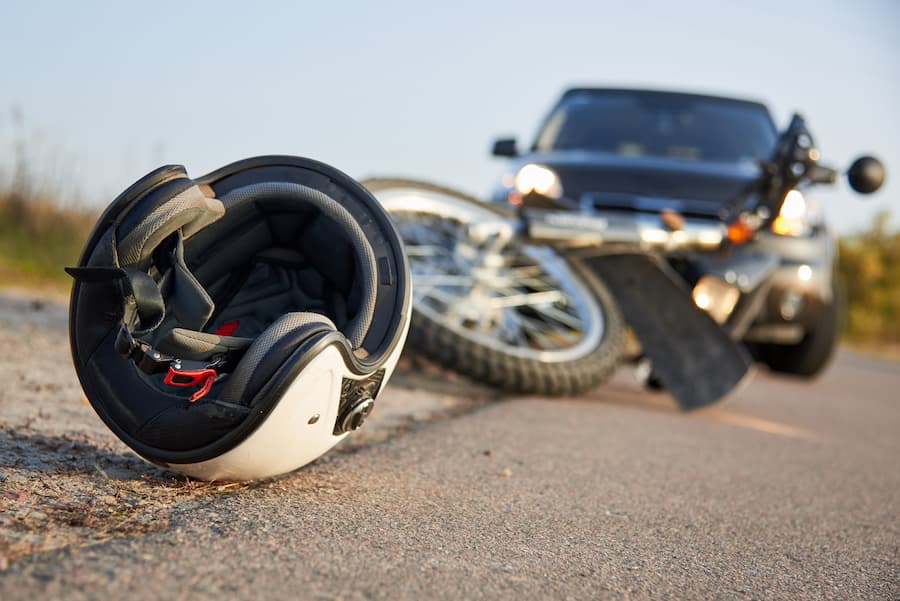When drivers violate traffic laws, such as by speeding, failing to yield, or operating a vehicle while distracted, they may inadvertently cause a collision with a motorcycle. Given the lack of a protective barrier, motorcyclists frequently suffer serious injuries in accidents – especially if they strike their head on the ground or another vehicle.
If you or someone you love suffered a head injury in a recent motorcycle collision, it’s important that you consult with an experienced Calgary motorcycle accident lawyer as soon as possible. A lawyer can swiftly investigate your motorcycle accident circumstances, file a claim with the at-fault driver’s insurer, and pursue the compensation you deserve for all of your accident-related losses.
How do Motorcycle Accidents Typically Happen?

Motorcycle accidents – often tragic and avoidable – frequently occur due to the negligence of others on the road. These incidents can unfold in various scenarios:
- One common cause of motorcycle accidents is when drivers fail to yield the right-of-way to motorcyclists. This negligence often happens at traffic intersections, where a driver may turn left in front of an oncoming motorcycle or fail to notice a motorcyclist approaching from another direction. The result can be catastrophic, as motorcycles offer minimal protection compared to enclosed vehicles.
- Accidents can also happen when drivers simply fail to see motorcycles. Due to their smaller size and profile, motorcycles can easily be overlooked – especially in blind spots or during lane changes. This lack of visibility can lead to sideswipe collisions or vehicles merging into motorcycles, causing riders to lose control and crash.
- Additionally, distracted driving poses a severe threat to motorcyclists. When drivers engage with their phones, adjust the radio, or even eat while behind the wheel, their attention shifts away from the road. This distraction decreases their ability to react to sudden changes in traffic, increasing the likelihood of colliding with a motorcycle.
- Road conditions may also play a role in some motorcycle accidents. Potholes, debris, or poorly maintained surfaces can be hazardous for all vehicles but pose an even greater danger to motorcycles. A minor road defect that may only jolt a car can cause a motorcyclist to lose control entirely, leading to a serious accident.
- Furthermore, alcohol and drug impairment significantly alter a driver’s judgment and reaction times. When intoxicated drivers take to the road, they endanger everyone around them, including motorcyclists, who are particularly vulnerable due to their lack of structural protection.
- Lastly, reckless driving behaviours such as speeding and aggressive maneuvers contribute to motorcycle accidents. Excessive speed reduces a driver’s ability to stop suddenly, increasing the chances of rear-ending a motorcycle or causing a collision at an intersection.
Seeking Treatment for a Brain Injury in a Motorcycle Accident
Traumatic brain injuries (TBIs) sustained in motorcycle accidents often require specialized medical treatments tailored to the severity and specific nature of the injury. These treatments aim to stabilize the patient, minimize further damage, and facilitate recovery, but they can vary widely depending on the extent of the brain injury.

- One of the primary initial treatments for a severe brain injury is emergency medical care. This may involve stabilizing the patient at the accident scene and transporting them to a trauma center equipped to handle such critical cases. At the hospital, immediate interventions such as airway management, control of bleeding, and intravenous fluids administration are crucial to ensure the patient’s stability.
- Once stabilized, diagnostic imaging plays a vital role in assessing the extent of the brain injury. CT scans and MRI scans are commonly used to visualize any hemorrhages, contusions, or swelling within the brain. These images help to guide further treatment decisions and provide a baseline for monitoring the patient’s progress.
- Surgical intervention may be necessary in cases where there are significant brain injuries that require immediate attention. This can involve procedures to remove blood clots, repair damaged blood vessels, or relieve pressure on the brain due to swelling (intracranial pressure). Neurosurgeons are trained to perform these delicate procedures to minimize further damage to the brain tissue.
- Following stabilization and acute care, rehabilitation becomes a crucial part of the treatment plan. Depending on the severity of the brain injury, rehabilitation may include physical therapy, occupational therapy, speech therapy, and cognitive rehabilitation. These therapies aim to help the patient regain lost functions, improve mobility, and relearn essential skills necessary for daily living.
- Medications are often prescribed to manage symptoms and complications associated with brain injuries. These may include medications to reduce swelling (steroids), prevent seizures (anticonvulsants), control pain, manage agitation or aggression, and address other specific symptoms that arise during recovery.
- Long-term care and monitoring are essential for patients recovering from brain injuries sustained in motorcycle accidents. This may involve ongoing medical appointments, imaging studies to track healing progress and adjustments to treatment plans based on the patient’s evolving needs and recovery milestones.
An experienced motorcycle accident lawyer in your area can handle the legal components of your case while you focus on recovering from your head or brain injury.
Proving the Legal Elements of a Motorcycle Accident Case Involving a Brain Injury
Proving the legal elements of a motorcycle accident case that involves a brain injury means establishing liability (in other words, fault) and damages. Here’s a breakdown of the key elements typically involved:
- Duty of Care – The first legal element to establish is that the defendant (often another driver or entity) owed a duty of care to the plaintiff (the injured motorcyclist). This duty is generally implied on all drivers to drive safely and follow traffic laws to prevent harm to others on the road.
- Breach of Duty – The plaintiff must show that the defendant breached their duty of care. This may involve actions like reckless driving, speeding, failure to yield, distracted driving, or any other behaviour that deviates from what a reasonable person would do in similar circumstances.
- Causation – There needs to be a direct link (causal connection) between the defendant’s breach of duty and the brain injury that the plaintiff suffered. This requires demonstrating that the defendant’s actions were a substantial factor in causing the accident and subsequent injury.
- Damages – The plaintiff must also prove that they suffered actual damages as a result of the brain injury. This includes lost income, loss of earning capacity, pain and suffering, and other losses resulting from the accident.
- Evidence – Proving these elements often relies heavily on evidence such as police reports, eyewitness testimony, expert opinions (such as medical experts on the nature and extent of the brain injury), medical records documenting treatment and prognosis, accident reconstruction reports, and any other documentation that supports the plaintiff’s claims.
- Negligence – In many motorcycle accident cases, negligence is a central issue. To establish negligence, the plaintiff must show that the defendant’s actions fell below the standard of care expected, considering the circumstances. For instance, if a driver ran a red light and collided with a motorcyclist who had the right of way, this is a clear case of negligence.
A skilled motorcycle accident lawyer can gather the necessary evidence to satisfy the burden of proof in your case and recover the compensation you deserve.
How Can a Lawyer Help with a Brain Injury Case?
In a motorcycle accident case involving a brain injury, hiring a lawyer can be crucial in navigating the complicated legal and medical aspects and pursuing fair compensation and justice. Here’s how a lawyer can assist:
- Legal Knowledge – A lawyer who routinely handles personal injury cases brings in-depth knowledge of relevant laws and regulations to the table. They understand the complexities of proving negligence, duty of care, and other legal elements necessary to build a strong case on behalf of the injured motorcyclist.
- Investigation – Lawyers conduct thorough investigations into the circumstances surrounding a motorcycle accident. This includes gathering police reports, interviewing witnesses, and obtaining expert opinions from accident reconstruction specialists and others to determine liability.
- Medical Understanding – Understanding the medical implications of a brain injury is crucial. Personal injury lawyers work closely with medical experts to assess the severity of the injury, prognosis for recovery, and the effect on the victim’s life. This helps in accurately calculating the damages owed to the injured party.
- Negotiation Skills – Motorcycle accident lawyers negotiate with insurance companies on behalf of their clients. Insurance companies often try to minimize payouts, but a skilled lawyer can advocate for fair compensation covering lost income, pain and suffering, and other damages incurred due to the accident.
- Court Representation – If a fair settlement cannot be reached through negotiation, a skilled motorcycle accident lawyer is prepared to take the case to court. They present the evidence, argue the legal principles, and advocate vigorously for the rights of their client in front of a judge and jury.
- Experience with Similar Cases – Many experienced personal injury lawyers have handled numerous motorcycle accident cases involving brain injuries. They understand the common challenges and strategies necessary to achieve successful outcomes for their clients.
- Emotional Support – Dealing with a brain injury from a motorcycle accident can be emotionally taxing. A lawyer provides compassionate support throughout the legal process, offering guidance and reassurance to their client and their family.
- Statute of Limitations – Lawyers ensure that all legal deadlines are met. Failing to file a claim within the specified timeframe can result in losing the right to seek compensation altogether.
Recovering Compensation for a Brain Injury in a Motorcycle Accident

In a motorcycle accident case that involves a brain injury, several types of damages can be pursued to compensate for the physical, emotional, and financial effects of the injury. Here are the key types of recoverable compensation in motorcycle accident cases:
- Loss of Earnings – If the brain injury prevents the injured person from working temporarily or permanently, they may be entitled to compensation for lost income. This can cover the period during which they are unable to work due to recovery or disability resulting from the injury.
- Loss of Earning Capacity – In cases where the brain injury results in a permanent disability or impairment that reduces the individual’s ability to earn income in the future, compensation may be awarded for loss of earning capacity. This takes into account the person’s diminished ability to work and earn a living compared to their pre-injury earning potential.
- Pain and Suffering – Non-economic damages such as pain, suffering, and emotional distress resulting from the brain injury and its aftermath can be compensated. This includes physical pain, mental anguish, loss of enjoyment of life, and emotional trauma experienced as a result of the accident and injury.
- Loss of Consortium – In some cases, the spouse or immediate family members of the injured person may be entitled to recover compensation for the loss of companionship, support, and services of the injured person due to their brain injury. This recognizes the effect of a brain injury on the family unit and relationships.
- Punitive Damages – In rare cases where the defendant’s conduct was particularly egregious or intentional, punitive damages may be awarded. These damages are intended to punish the defendant and deter similar misconduct in the future rather than compensate the injured person directly.
Recovering these types of compensation requires demonstrating the extent of the brain injury, showing the effects of the brain injury on the motorcyclist’s life, and proving the at-fault party’s liability for the motorcycle accident. An experienced motorcycle accident lawyer plays a crucial role in advocating for their clients’ rights and ensuring that they receive fair and just compensation for the damages they have suffered due to the accident and resulting brain injury.
Speak to a Skilled Motorcycle Accident Lawyer in Your Area Right Away
After suffering injuries in a motorcycle crash, it’s essential that you have a knowledgeable motorcycle accident lawyer on your side as quickly as possible. A lawyer can handle the legal aspects of your case while you focus on recovering from your head or brain injury. Your lawyer can also represent you during all settlement negotiations – and in-court legal proceedings – to maximize your overall compensation award.
Begin by scheduling your free case evaluation today. Put your case in the capable hands of a trusted Calgary personal injury attorney.
